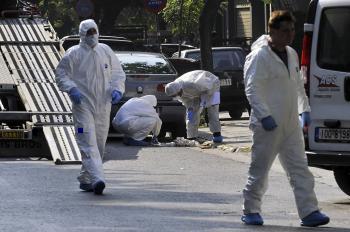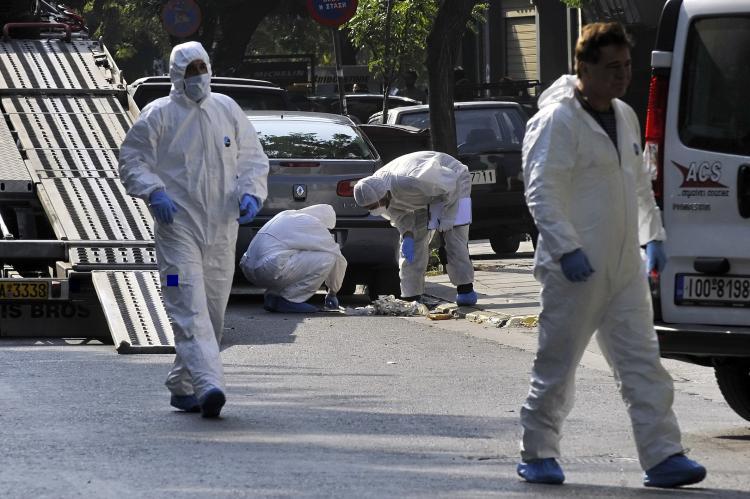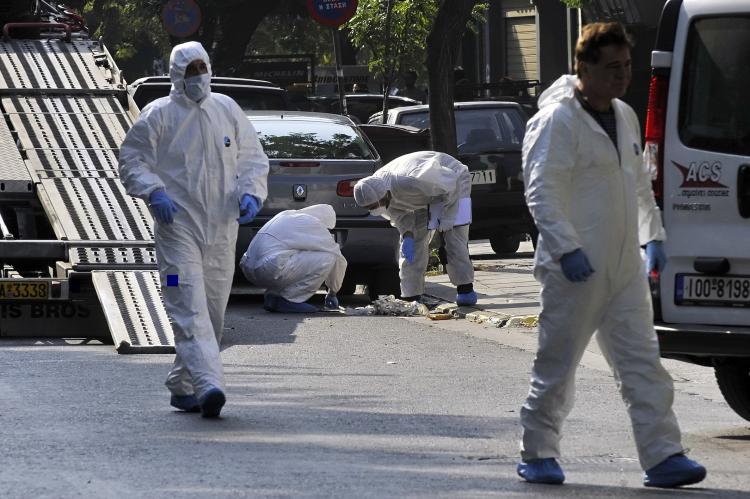The recent spate of letter bombs sent from Greece and Yemen to European leaders and diplomatic missions, has brought into international focus security holes in the system that have existed for years, despite efforts since 9/11 to plug them, according to reports.
On Thursday, the 14th parcel bomb in Greece in week was sent to the French Embassy in Athens, but the police managed to neutralize it after receiving an alert from French Embassy staff.
The latest incident occurred after Greek authorities suspended foreign air cargo delivery on Wednesday in an effort to stop suspected domestic guerrilla groups from sending explosives to European leaders, including German Chancellor Angela Merkel and French President Nicholas Sarkozy.
The potential for such attacks was not unknown. A report published by the Center for American Progress in 2007, penned by Philip J. Crowley now spokesperson for the State Department, stated that “placing a bomb in a commercial shipment via global supply chains is an obvious and feasible means to bring down a U.S. airliner without having to board it or even enter the United States.”
The Yemen-originated mail bombs were disguised as printer components sent via UPS and FedEx to Chicago synagogues. The Yemen-based branch of al-Qaeda is believed to be responsible for the attempted terrorist plot.
The bombs contained the explosive PETN, which is difficult to detect with conventional airport screening. The explosives were only discovered after Saudi security forces tipped off officials in Dubai and the U.K. After that, Germany, France, and England canceled cargo shipments from Yemen.
After the 2007 report had came out, Congress passed legislation, the 9/11 Commission Act, requiring that within three years, screening for 100 percent of all cargo placed on passenger flights. The deadline passed in August this year, but industry analysts say the new standards were not yet in place.
According to a Heritage Foundation report published in June, the U.S. transportation security administration is not fully capable due to several constraints.
One is that air carrier facilities were never designed to handle the task of conducting piece-level scanning.
A second is that the approved technologies were engineered to inspect baggage, not large shipments arriving in containers and pallets that may contain 200 individual pieces. Therefore, effective screening means taking the packages apart, which eats up time and money. It’s also prone to false alarms and human error, says the report.
“Currently, there is no government certified technology to screen standard size pallets and large items,” said Giovanni Bisignani, the International Air Transport Association’s (IATA) director general in a Tuesday’s press release after the World Aviation Security Summit in Frankfurt, Germany.
“There is some promising technology but it is taking far too long to move from the laboratory to the airport. We must speed up the process.”
Cost is another important factor, not just of the screening equipment but the cost to businesses of delays and bottlenecks. “The 100 percent screening mandate truly is an unfunded mandate on the private sector,” says the report.
The 100 percent mandate also applies to cargo entering the United States from other countries, but not all countries can guarantee the same level inspection.
The overall assessment, is that the system is far from airtight despite best regulatory efforts.
“The U.S. government has taken important steps to improve air cargo security, but last week’s episode makes it clear that vulnerabilities remain,” the Center for American Progress says in a statement.
Another gap occurs when goods transfer from surface to air, especially if the process is controlled by the same carrier. The goods, “may not always receive double inspection when it gets on the airplane,” said Alan Hedge, a research director with Air Cargo Management Group.
Airline International officials say that governments and airline carriers should develop strict regulatory measures to make the skies more secure.
IATA has called on regulators and air carriers to put joint efforts to modernize the 40-year-old airport screening process.
“Belts, shoes and shampoos are not the problem. We must shift the screening focus from looking for bad objects to finding terrorists. It is not acceptable to treat passengers as terrorists until they prove themselves innocent,” said Bisignani.
While the attention this week has been focused on airmail carried by passenger planes, much more cargo enters the United States by other means, cargo flights and cargo ship. Currently cargo flights and cargo ships are not subject to the same scrutiny.
Containers, on the other hand, are required to be inspected before being shipped to the United States. However, the United States has not been able to enforce international compliance in this area.
The European Commission studied the feasibility of complying with U.S. law and concluded that it would not be possible, or very productive.
For one thing, most ports and terminals would have to be entirely reconfigured to make room for scanning operations. On an even larger scale, compliance would impact the entire movement of goods in Europe since smaller ports would never be able to meet the standard.
The report assessed that “the effectiveness of current scanning procedures would seriously decline as they attempted to deal with the sheer volume of cargo. Moreover, scanning all containers may well induce the authorities into a false sense of security and lower the vigilance of the Customs carrying out and analysing the results of the scans.”
In the final analysis by the EC, the prospects for universal buy-in to the U.S. plan seem unlikely.
“There are few if any governments, except the United States, that support the 9/11 Act, because they realize it would be difficult to defend the deployment of public sector resources to produce no tangible results.”
On Thursday, the 14th parcel bomb in Greece in week was sent to the French Embassy in Athens, but the police managed to neutralize it after receiving an alert from French Embassy staff.
The latest incident occurred after Greek authorities suspended foreign air cargo delivery on Wednesday in an effort to stop suspected domestic guerrilla groups from sending explosives to European leaders, including German Chancellor Angela Merkel and French President Nicholas Sarkozy.
The potential for such attacks was not unknown. A report published by the Center for American Progress in 2007, penned by Philip J. Crowley now spokesperson for the State Department, stated that “placing a bomb in a commercial shipment via global supply chains is an obvious and feasible means to bring down a U.S. airliner without having to board it or even enter the United States.”
The Yemen-originated mail bombs were disguised as printer components sent via UPS and FedEx to Chicago synagogues. The Yemen-based branch of al-Qaeda is believed to be responsible for the attempted terrorist plot.
The bombs contained the explosive PETN, which is difficult to detect with conventional airport screening. The explosives were only discovered after Saudi security forces tipped off officials in Dubai and the U.K. After that, Germany, France, and England canceled cargo shipments from Yemen.
After the 2007 report had came out, Congress passed legislation, the 9/11 Commission Act, requiring that within three years, screening for 100 percent of all cargo placed on passenger flights. The deadline passed in August this year, but industry analysts say the new standards were not yet in place.
According to a Heritage Foundation report published in June, the U.S. transportation security administration is not fully capable due to several constraints.
One is that air carrier facilities were never designed to handle the task of conducting piece-level scanning.
A second is that the approved technologies were engineered to inspect baggage, not large shipments arriving in containers and pallets that may contain 200 individual pieces. Therefore, effective screening means taking the packages apart, which eats up time and money. It’s also prone to false alarms and human error, says the report.
“Currently, there is no government certified technology to screen standard size pallets and large items,” said Giovanni Bisignani, the International Air Transport Association’s (IATA) director general in a Tuesday’s press release after the World Aviation Security Summit in Frankfurt, Germany.
“There is some promising technology but it is taking far too long to move from the laboratory to the airport. We must speed up the process.”
Cost is another important factor, not just of the screening equipment but the cost to businesses of delays and bottlenecks. “The 100 percent screening mandate truly is an unfunded mandate on the private sector,” says the report.
The 100 percent mandate also applies to cargo entering the United States from other countries, but not all countries can guarantee the same level inspection.
The overall assessment, is that the system is far from airtight despite best regulatory efforts.
“The U.S. government has taken important steps to improve air cargo security, but last week’s episode makes it clear that vulnerabilities remain,” the Center for American Progress says in a statement.
International Freight
Another gap occurs when goods transfer from surface to air, especially if the process is controlled by the same carrier. The goods, “may not always receive double inspection when it gets on the airplane,” said Alan Hedge, a research director with Air Cargo Management Group.
Airline International officials say that governments and airline carriers should develop strict regulatory measures to make the skies more secure.
IATA has called on regulators and air carriers to put joint efforts to modernize the 40-year-old airport screening process.
“Belts, shoes and shampoos are not the problem. We must shift the screening focus from looking for bad objects to finding terrorists. It is not acceptable to treat passengers as terrorists until they prove themselves innocent,” said Bisignani.
Maritime Cargo
While the attention this week has been focused on airmail carried by passenger planes, much more cargo enters the United States by other means, cargo flights and cargo ship. Currently cargo flights and cargo ships are not subject to the same scrutiny.
Containers, on the other hand, are required to be inspected before being shipped to the United States. However, the United States has not been able to enforce international compliance in this area.
The European Commission studied the feasibility of complying with U.S. law and concluded that it would not be possible, or very productive.
For one thing, most ports and terminals would have to be entirely reconfigured to make room for scanning operations. On an even larger scale, compliance would impact the entire movement of goods in Europe since smaller ports would never be able to meet the standard.
The report assessed that “the effectiveness of current scanning procedures would seriously decline as they attempted to deal with the sheer volume of cargo. Moreover, scanning all containers may well induce the authorities into a false sense of security and lower the vigilance of the Customs carrying out and analysing the results of the scans.”
In the final analysis by the EC, the prospects for universal buy-in to the U.S. plan seem unlikely.
“There are few if any governments, except the United States, that support the 9/11 Act, because they realize it would be difficult to defend the deployment of public sector resources to produce no tangible results.”







